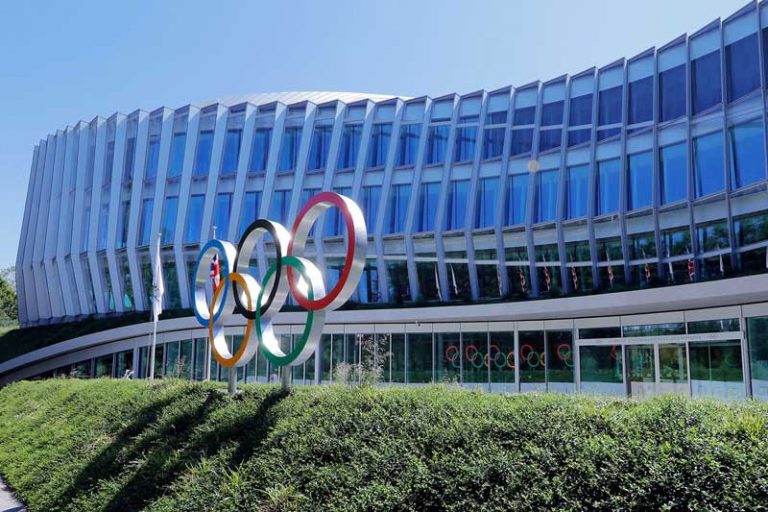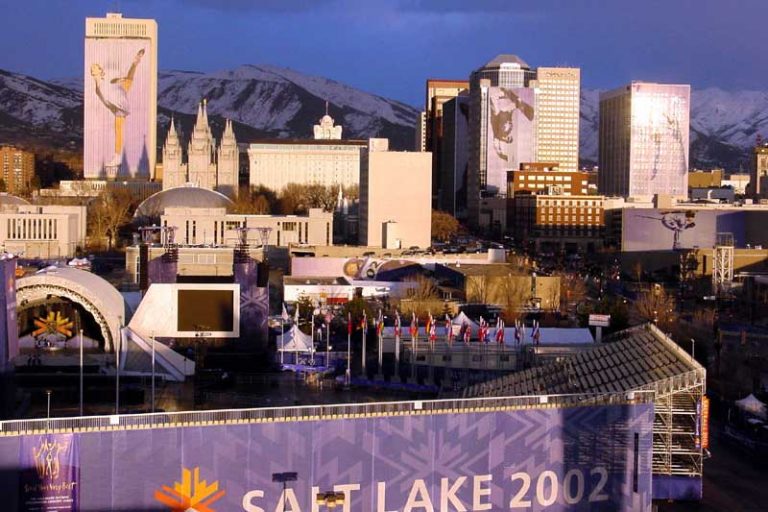The Salt Lake City-Utah Committee For The Games (SLC-UT) pushed forward with plans to host a future Olympic Winter Games last month when the organization penned a letter to International Olympic Committee (IOC) President Thomas Bach.

“It is our plan sometime in the near future, when international travel resumes, to send a small delegation to Lausanne to personally express our solidarity and enthusiasm for the Olympic Movement,” the letter signed by Utah Governor Gary Herbert, Salt Lake City Mayor Erin Mendenhall, SLC-UT Chair Cindy Crane and CEO Fraser Bullock.
The letter was an important “formal step in an informal process” and part of the dialogue phase,” Crane said of the milestone during a strategic board meeting held Tuesday.
“We got a very supportive and very quick follow-up back from IOC President Thomas Bach, both supportive in our intentions and interest but also high recognition for what we are doing in the space of sport,” Crane said.
In the response, the President said the IOC is “pleased to enter into continuous dialogue with Salt Lake City.”
The IOC’s future host commission first confirmed Salt Lake City’s interest in January.
Governor Herbert said the purpose and timing of the letter was “to reiterate our interest, our, commitment to host a Winter Games.”
“We also put in there that there is no place better prepared, better capable of hosting a Winter Olympics than here in Utah and the Salt Lake area,” the Governor added.
Full letter from USOPC to IOC President Thomas Bach (Oct. 30, 2020)
Full letter from SLC-UT to IOC President Thomas Bach (Oct. 30, 2020)
Response letter from IOC President Thomas Bach to SLC-UT (Nov. 3, 2020)
Two years ago Salt Lake City was chosen to represent the United States in any future Winter Games bid by the USOPC. The Utah capital was elected over domestic bids from Denver and Reno-Tahoe due mainly to its existing facilities that remain as a legacy from the 2002 Games.
The correspondence was joined by a second letter, both dated October 30, from the United States Olympic and Paralympic Committee (USOPC) outlining its “continued commitment” to the Olympics and hosting the Winter Games.
“While we have been quiet these last many months we have continued our dialogue with the USOPC and IOC and it is now the time to begin moving forward to bring the Games back to SLC Utah in either 2030 or 2034,” Crane said, underlining the importance of the letters and favourable response.

Yet Sarah Hirshland, the USOPC CEO who co-signed the letter stressed that the path forward will remain slow.
She said “the timeline around the bid remains a bit uncertain, and frankly, likely a bit delayed over what might have been possible due to the postponement of the Tokyo Games and the COVID realities being faced, not only by all of us but by the International Olympic Committee and the burdens on them are extreme.”
“No need to be concerned about timing.
“We are on track, we are well positioned and on the record and very clear about our motivations and our intentions and we’re doing all the things we need to be doing to put ourselves in position to be successful with that bid when the right time comes.”
Also remaining uncertain is the edition of the Games that the USOPC intends to target – 2030 or 2034.
When asked by GamesBids.com if he thought a 2030 Games, only 18 months following the Los Angeles 2028 Summer Games, might be less attractive than hosting in 2034 due to the risk of revenue splitting bid CEO Fraser Bullock said “we’re still working through those issues and those questions and trying to put together the foundational elements as best we can but that’s certainly one of the factors we’re considering.”
Indeed the USOPC was delicate about the issue in its letter to the IOC explaining “the time will have to be right for all stakeholders, and we remain first and foremost committed to the success of the LA Games in 2028 – working collaboratively on elements that will engage the world in new and exciting ways, but we also understand the power of Utah’s legacy and the ongoing benefits and successful programs they continue to provide.
Olympic organizing committees are granted exclusive marketing and sponsorship rights for a four year period leading up to and including the Games. Should Salt Lake City be awarded the 2030 Winter Games, that important revenue earning period will conflict with LA’s and within the same national market, possibly reducing the earning potential of each event.
BidWeek: Why Salt Lake City Will Almost Certainly Host The 2034 Winter Olympics
But the IOC has had difficulties attracting bids, with several dropping out of races for the 2022 and 2026 editions won by Beijing and Milan-Cortina in Italy, respectively. With new reforms put in place by the IOC that call for sustainability and using existing venues where they exist – Salt Lake City remains a strong choice when the IOC needs it.
In January, prior to the pandemic, Bach commended the bid representing former 1972 host city Sapporo and felt strongly that the 2030 Games could be awarded as early as this year. But with the postponement of Tokyo 2020 and the additional costs, it’s not clear whether another Japanese city will be available for a Games so soon.
Another bid representing Pyrenees-Barcelona from Spain was recently put on hold so the government could instead focus on pandemic recovery. Interest in developing a bid from Vancouver, Canada has also been pushed into next year for the same reason.
Salt Lake City remains a safety net for the IOC, in case it remains the only viable choice for 2030.
“Please keep in mind that we start in a fabulous place with all of our venues in place, fully active and utilized,” Crane told GamesBids.com.
“‘Starting points matter’ is my message there, so we feel very good about a Games in 2030 or 2034 but we’re still doing our work.”


